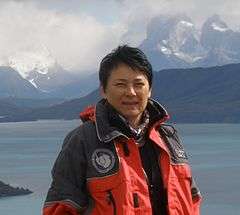Roumiana Metcheva
| Roumiana Metcheva | |
|---|---|
 | |
| Born | July 13, 1950 |
| Nationality | Bulgaria |
| Fields | Ecotoxicology |
| Institutions |
Bulgarian Academy of Sciences Bulgarian Antarctic Institute |
| Alma mater |
BSc Sofia University PhD Jagiellonian University |
|
Website www.roumiana-mecheva.net | |
Roumiana Panayotova Metcheva (Bulgarian: Румяна Панайотова Мечева) is a Bulgarian Antarctic researcher, best known for her work on ecotoxicology and biodiversity protection in the Antarctic.[1][2] She is the Head of Department of Ecosystem Research, Environmental Risk Assessment and Conservation Biology at the Bulgarian Academy of Sciences.[3] Mount Mecheva was named after Metcheva for recognition of her work.
Early life and education
Metcheva was born on July 13, 1950 in Sofia, Bulgaria. She graduated with a Master in Biology from the Faculty of Biology at the Sofia University (St. Kliment Ohridski) in October 1975.[4] She completed her D.Sc. in Biology, from the Institute of biology and environment at Jagiellonian University, Poland in 1980, researching the bioenergetics and energy flow in Strix aluco (Tawny owl) populations.
Career and impact
Metcheva was a scientific researcher at the Institute of Zoology, Bulgarian Academy of Sciences from 1980 – 1993.[5] She was then appointed as the chief of the ‘Physiological Ecology’ laboratory at the Institute of Zoology at the Bulgarian Academy of Sciences in 1993 and at present works at the Institute of Biodiversity and Ecosystem Research (IBER).[5] She is now Head of Department of Ecosystem Research, Environmental Risk Assessment and Conservation Biology, as well as Chairman of the General Assembly of Researchers at the Institute of Biodiversity and Ecosystem Research at the Bulgarian Academy of Sciences.[3][6]
Metcheva was a Member of Bulgarian Antarctic Expeditions from 1999 – 2010 and has been a member of the Bulgarian Antarctic Institute since 2000.[4] Her research has focused on Antarctic penguins and fishes with a particular focus on toxin accumulation in the food chain.[7][8]
Awards and honours
Mount Mecheva was named after Metcheva for recognition of her work at St Kilment Ohridski Base in 1999/2000 and subsequent seasons.[9][10]
References
- ↑ Metcheva, R.; Yurukova, L.; Teodorova, S.; Nikolova, E. (2006-06-01). "The penguin feathers as bioindicator of Antarctica environmental state". Science of the Total Environment. 362 (1–3): 259–265. PMID 15967486. doi:10.1016/j.scitotenv.2005.05.008.
- ↑ Metcheva, Roumiana; Yurukova, Lilyana; Teodorova, Svetla E. (2011-02-23). "Biogenic and toxic elements in feathers, eggs, and excreta of Gentoo penguin (Pygoscelis papua ellsworthii) in the Antarctic". Environmental Monitoring and Assessment. 182 (1–4): 571–585. ISSN 0167-6369. PMID 21340549. doi:10.1007/s10661-011-1898-9.
- 1 2 "Department of Ecosystem Research, Environmental Risk Assessment and Conservation Biology". www.iber.bas.bg. Bulgarian Academy of Sciences. Retrieved 2016-06-15.
- 1 2 "Roumiana Metcheva". www.iber.bas.bg. Bulgarian Academy of Sciences. Retrieved 2016-06-15.
- 1 2 "About the Institute of Biodiversity and Ecosystem Research". www.iber.bas.bg. Bulgarian Academy of Sciences. Retrieved 2016-06-15.
- ↑ "Institute of Biodiversity and Ecosystem Research Governing Body". www.iber.bas.bg. Bulgarian Academy of Sciences. Retrieved 2016-06-15.
- ↑ Dimitrov, K.; Metcheva, R.; Kenarova, A. (2009-01-01). "Salmonella Presence—An Indicator of Direct and Indirect Human Impact on Gentoo in Antarctica". Biotechnology & Biotechnological Equipment. 23 (sup1): 246–249. ISSN 1310-2818. doi:10.1080/13102818.2009.10818411.
- ↑ Beltcheva, Michaela; Metcheva, Roumiana; Peneva, Vesela; Marinova, Margarita; Yankov, Yordan; Chikova, Vania (2010-06-23). "Heavy Metals in Antarctic Notothenioid Fish from South Bay, Livingston Island, South Shetlands (Antarctica)". Biological Trace Element Research. 141 (1–3): 150–158. ISSN 0163-4984. PMID 20571934. doi:10.1007/s12011-010-8739-5.
- ↑ "Bulgarian Antarctic Gazetteer". apcbg.org. Retrieved 2016-06-20.
- ↑ "Mount Mecheva". Composite Gazetteer of Antarctica. Retrieved 2016-06-20.